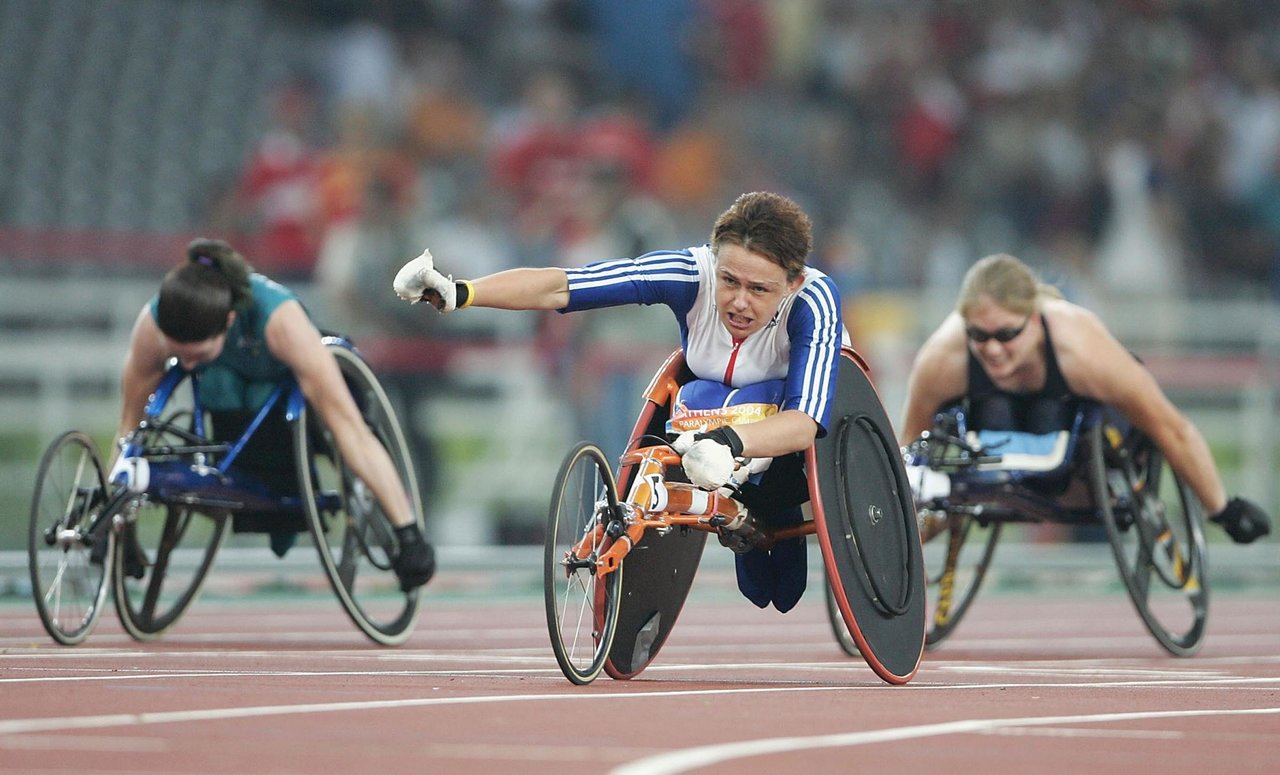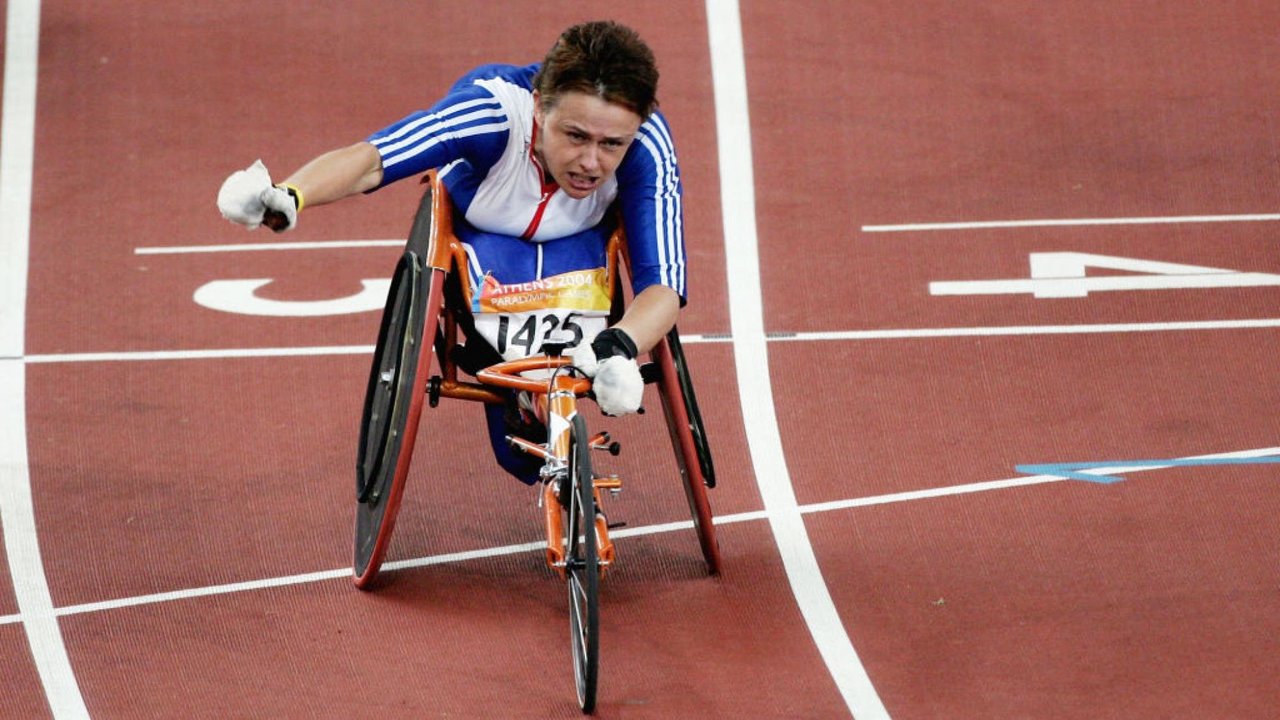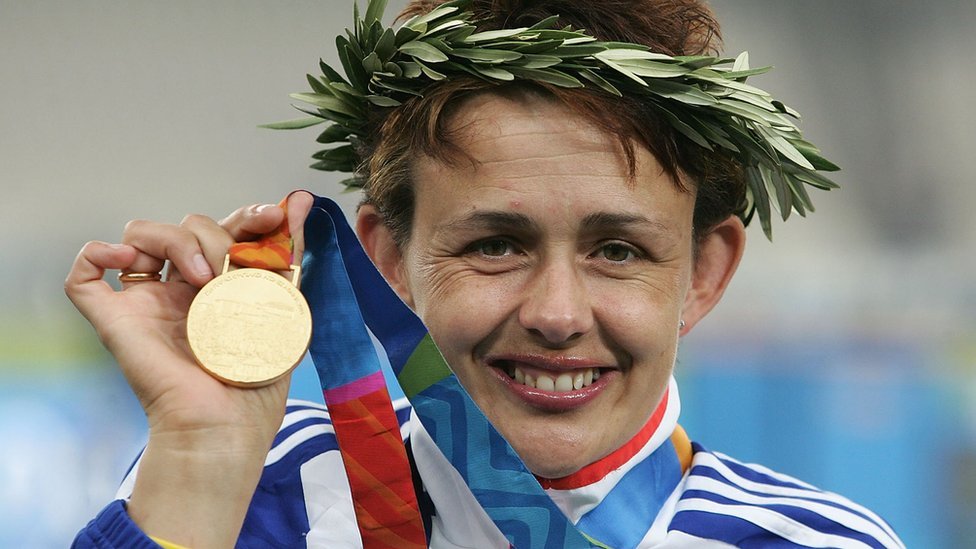British Heritage
Remember, Cherish, Learn.
beta
Tanni Grey-Thompson
An Emblem of British Heritage and the Paralympic Movement.
Carys Davina "Tanni" Grey-Thompson, Baroness Grey-Thompson, DBE, DL, born on 26 July 1969, is a distinguished figure in British heritage, primarily celebrated as a Paralympic champion, but also notable for her significant contributions in television, politics, and public service. Her endeavours across these diverse fields have influenced public perception on disability, elevated the profile of Paralympic sports, and promoted inclusivity, cementing her legacy as an integral part of the nation's history and culture.
Grey-Thompson's athletic career in wheelchair racing took off at the Junior National Games for Wales in 1984, marking the start of a journey filled with extraordinary accomplishments. In Seoul 1988, she clinched her first Paralympic medal, a bronze in the 400m, demonstrating her capacity for international competition.
Over the span of her career, Grey-Thompson participated in five Paralympic Games, with her last in Athens 2004, bringing her Paralympic medal count to an astounding 16, including 11 gold. Beyond the Paralympics, she proved her dominance in her sport with 13 World Championship medals and more than 30 world records. Her prowess was not confined to the track; she won the London Marathon six times between 1992 and 2002, marking a decade of unparalleled consistency and determination.
Parallel to her athletic career, Grey-Thompson developed a fruitful television presenting career, providing her a platform to influence broader audiences. From BBC Wales X-ray to BBC One, her contributions helped normalise the presence of disabled persons in mainstream media. As one of the first and only female wheelchair users to present on television, she broke barriers, challenging stereotypes and societal biases.
Her television career extended to international sporting events, where she was a key member of the BBC commentary team, beginning with the Beijing Paralympics 2008. Grey-Thompson's extensive experience as an athlete lent authenticity and insight to her commentary, deepening public understanding of Paralympic sports.
Grey-Thompson leveraged her fame and experience for advocacy, serving on numerous boards and councils, including the National Disability Council, the English Lottery Awards Panel, UK Sport, and the London Legacy Development Corporation. From 2007 to 2018, she served on the board of the London Marathon and Transport for London, reflecting her commitment to both sport and public service.
Her advisory and consultant roles extended to charity work. As a patron of multiple charities, including the Duke of Edinburgh Awards scheme and the Guernsey Disability Alliance, she utilised her platform to raise awareness and funds for crucial causes.
In July 2011, she was announced as the President of the Leadership 20:20 Commission, the Commission on the future leadership of Civil Society, further cementing her dedication to creating a more equitable society.
On 23 March 2010, Grey-Thompson was created a Life Peer, a significant milestone that expanded her influence to the sphere of national politics. She was introduced to the House of Lords on 29 March, swearing the oath of allegiance in both English and Welsh, and she sits as a crossbencher.
Grey-Thompson has used her position in the House of Lords to advocate for disability rights and wider social issues, making her mark on British political history. In August 2014, she joined 200 public figures in opposing Scottish independence, demonstrating her willingness to speak out on contentious issues.
Grey-Thompson's stellar career has been acknowledged with a slew of accolades. She has been appointed MBE, OBE, and DBE for her "services to sport," reflecting her transformative impact on Paralympic sports.
She was thrice named the BBC Wales Sports Personality of the Year, and in 2000, she was the third in the BBC Sports Personality of the Year, trailing only Steve Redgrave and Denise Lewis.
Beyond sporting honours, Grey-Thompson's influence has been recognised in academia. She has received numerous honorary degrees from esteemed institutions, reflecting her broad impact on society.
On a personal level, Grey-Thompson has also penned an autobiography titled "Seize the Day," which was published in 2001. The title aptly encapsulates her approach to life: seizing every opportunity to excel, advocate, and make a difference.
From the racing tracks to television screens, from public service roles to the House of Lords, Tanni Grey-Thompson has blazed a trail of excellence, advocacy, and resilience. Her legacy transcends her personal achievements and represents a paradigm shift in societal attitudes towards disability, inclusivity, and equality. Through her life's work, she has enriched British heritage, leaving an indelible mark on the nation's history and culture.
The Athletic Prowess
Grey-Thompson's athletic career in wheelchair racing took off at the Junior National Games for Wales in 1984, marking the start of a journey filled with extraordinary accomplishments. In Seoul 1988, she clinched her first Paralympic medal, a bronze in the 400m, demonstrating her capacity for international competition.
Over the span of her career, Grey-Thompson participated in five Paralympic Games, with her last in Athens 2004, bringing her Paralympic medal count to an astounding 16, including 11 gold. Beyond the Paralympics, she proved her dominance in her sport with 13 World Championship medals and more than 30 world records. Her prowess was not confined to the track; she won the London Marathon six times between 1992 and 2002, marking a decade of unparalleled consistency and determination.
Pioneering Role in Television and Media
Parallel to her athletic career, Grey-Thompson developed a fruitful television presenting career, providing her a platform to influence broader audiences. From BBC Wales X-ray to BBC One, her contributions helped normalise the presence of disabled persons in mainstream media. As one of the first and only female wheelchair users to present on television, she broke barriers, challenging stereotypes and societal biases.
Her television career extended to international sporting events, where she was a key member of the BBC commentary team, beginning with the Beijing Paralympics 2008. Grey-Thompson's extensive experience as an athlete lent authenticity and insight to her commentary, deepening public understanding of Paralympic sports.
Tireless Advocate for Inclusion and Public Service
Grey-Thompson leveraged her fame and experience for advocacy, serving on numerous boards and councils, including the National Disability Council, the English Lottery Awards Panel, UK Sport, and the London Legacy Development Corporation. From 2007 to 2018, she served on the board of the London Marathon and Transport for London, reflecting her commitment to both sport and public service.
Her advisory and consultant roles extended to charity work. As a patron of multiple charities, including the Duke of Edinburgh Awards scheme and the Guernsey Disability Alliance, she utilised her platform to raise awareness and funds for crucial causes.
In July 2011, she was announced as the President of the Leadership 20:20 Commission, the Commission on the future leadership of Civil Society, further cementing her dedication to creating a more equitable society.
A Voice in the Parliament
On 23 March 2010, Grey-Thompson was created a Life Peer, a significant milestone that expanded her influence to the sphere of national politics. She was introduced to the House of Lords on 29 March, swearing the oath of allegiance in both English and Welsh, and she sits as a crossbencher.
Grey-Thompson has used her position in the House of Lords to advocate for disability rights and wider social issues, making her mark on British political history. In August 2014, she joined 200 public figures in opposing Scottish independence, demonstrating her willingness to speak out on contentious issues.
A Legacy of Honours and Recognition
Grey-Thompson's stellar career has been acknowledged with a slew of accolades. She has been appointed MBE, OBE, and DBE for her "services to sport," reflecting her transformative impact on Paralympic sports.
She was thrice named the BBC Wales Sports Personality of the Year, and in 2000, she was the third in the BBC Sports Personality of the Year, trailing only Steve Redgrave and Denise Lewis.
Beyond sporting honours, Grey-Thompson's influence has been recognised in academia. She has received numerous honorary degrees from esteemed institutions, reflecting her broad impact on society.
On a personal level, Grey-Thompson has also penned an autobiography titled "Seize the Day," which was published in 2001. The title aptly encapsulates her approach to life: seizing every opportunity to excel, advocate, and make a difference.
Conclusion
From the racing tracks to television screens, from public service roles to the House of Lords, Tanni Grey-Thompson has blazed a trail of excellence, advocacy, and resilience. Her legacy transcends her personal achievements and represents a paradigm shift in societal attitudes towards disability, inclusivity, and equality. Through her life's work, she has enriched British heritage, leaving an indelible mark on the nation's history and culture.
- Tanni Grey-Thompsonen.wikipedia.org








